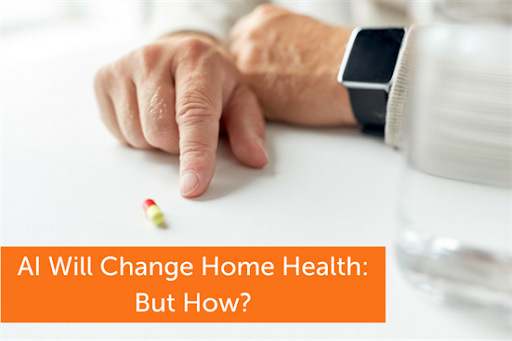The idea of artificial intelligence and its applications in healthcare has been a hot topic of conversation for several years now. Questions haven’t been related to the role of AI in healthcare, but rather focused on how AI will be used, and to what extent. While some expect that eventually, AI will play a major role in the actual delivery of care, to the point where doctors are eventually replaced by robots in the hospital, other see the role of AI in more of a research capacity, with algorithms being used to practice predictive medicine. In fact, that is already happening, with several major projects underway designed to analyze data from large patient populations, draw conclusions, and make recommendations for patient care.
In terms of home health care, there is no question that artificial intelligence is going to play a role in the industry and change how providers care for patients and provide important services. The question, though, is how? The most likely answer probably falls somewhere in the middle of the science fiction future of robot caregivers and AI as little more than a data analysis tool.
Helping Patients Age in Place
There’s no doubt that older Americans are more likely to “age in place” than ever before. It’s also no mystery, especially to home health providers, that the majority of medical care takes place outside of the physician’s office. However, for many patients, there is a disconnect between what healthcare providers know is best for a patient — such as a healthy diet — and what patients are able to do, especially if they are homebound. A diabetic patient, for example, who does not drive but lives alone several miles from the nearest grocery store, might have difficulty accessing the fresh foods he or she needs to maintain an ideal diet. The result is that the patient eats a great deal of processed or shelf-stable foods that aren’t ideal for maintaining optimal blood sugar levels.
This is where artificial intelligence can come in. Using home health care software, providers could identify those patients who may struggle to access the resources they need to follow doctor’s orders and help them find ways to access the what they need. In the case of the rural diabetic, AI could correlate patient locations, demographic data (e.g., their transportation options), and the proximity of grocery stores, to identify the patients who need extra support in this area.
This type of artificial intelligence can be put to use in multiple ways to help older adults age in place. We are already seeing this in the development of wearable devices that track and monitor patients and alert healthcare providers or other caregivers to potential issues. For instance, it’s possible to install sensors in the home, which over time can learn the resident’s typical routine. When anomalies occur; for example, the patient enters the bathroom but doesn’t come out for significantly longer than usual, the sensors could trigger an alert that leads a caregiver to call or come check on the person.
Beyond the Flashy Robots
Even though artificial intelligence in home healthcare isn’t quite as exciting as having a personal robot doctor, for those responsible for managing care and keeping it affordable and efficient, it’s just as exciting.
Some might think that using algorithms to make care decisions or influence care is little more than a depersonalization of medicine, but the fact is, AI can actually make medicine more personalized. For those with chronic conditions, AI programs can actually serve as coaches to help them make better lifestyle choices, and take control of their helps. These programs analyze data collected from patients, either via wearable devices or manual inputs (or both) and then make suggestions or provide encouragement, much like a doctor would — only without the doctor visit and for much less cost. The patient receives ultra-personalized suggestions and input from his or her physician, creating a more effective treatment plan.
And these types of programs are a form of prevention, which CMS and other agencies support. Preventive medicine is proven to reduce medical costs, and using AI to strengthen such programs can save a significant amount of money, given that prevention programs typically costs thousands of dollars per participant. In fact, there is speculation that CMS will begin reimbursing providers who use AI programs to personalize their practices and more effectively prevent costly illnesses and rehospitalizations.
At the end of the day, the term “artificial intelligence” is really a fancy way of saying “data analysis,” since the majority of AI functions are based on the collection and analysis of data, and then taking action — either manually or automatically — based on those conclusions. That doesn’t mean that everyone won’t have a personal assistance robot at some point in the future, but for now, it mostly means that patients will receive better care, be able to remain in their homes longer, and get more personalized and effective treatment plans.
Learn more about how Complia Health’s home health software can give your agency the data it needs to run more efficiently.




